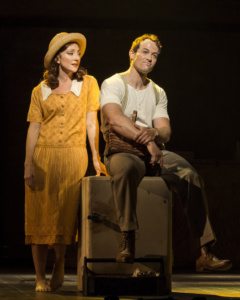Banjoes, bluegrass, and ballads, oh my! All three are in abundant supply at Pioneer Theatre Company in Utah’s first production of “Bright Star”, a winning new musical written by Steve Martin and Edie Brickell. For those who never turn their radio dial to the country station, this may sound like a nightmare. The score is an un-apologetically twang-filled letter to the American South, much more likely to feature a fiddle solo than a guitar riff. For all but the most hardened viewers, “Bright Star’s” down-home roots and old-fashioned nostalgia will have a subtle appeal even if you’ve never been tempted to join a hoedown.
Set in several small Southern towns in the 1920s and 1940s, “Bright Star” tells the story of Alice Murphy (Carmen Cusack), a sharp but isolated newspaper editor, and Billy Cane (A.J. Shively), an inexperienced but ambitious World War II serviceman anxious to start a writing career. As Alice slowly turns into a mentor and friend for Billy, the audience learns about dark secrets from Alice’s childhood, two decades earlier. As Alice attempts to reconcile these troubling experiences, her past and present come together in unexpected ways.
The story here is fairly pedestrian, and never particularly surprising: the weakest parts of the show are the most plot-heavy. Martin, who wrote the book, excels at small character moments and naturally funny bits of dialogue, but he can get bogged down in the show’s more serious moments. Though this production is blessed with a uniformly excellent cast, it is easy to see some characters turning bland in the hands of a less talented ensemble.
These issues feel like minor nitpicks as the musical unfolds. Much of what makes this show so endearing and engrossing is its departure from recent trends in musical theatre. This show has no cynicism; no irony; no attempts to break the fourth wall or sneak in a snarky pop culture reference. It is, blessedly, not an adaptation of a film or a jukebox musical wrapped around existing songs. What “Bright Star” turns out to be is an unfortunate rarity among new musicals: a serious, earnest, character-based narrative with a score of entirely original songs. These songs, music by Martin and Brickell and lyrics by Brickell, are charming and successful departures from traditional show tunes. Performed onstage by a small band of musicians, a setup that has shown up a fair bit recently, from “Once” to “School of Rock”, the songs are tuneful and gently melodic. Better yet, they capture the musical’s Southern setting naturally, gracefully reflecting the show’s infectious warmth and optimism.

Like the musical itself, the show’s technical design is accomplished but not fussy. The work of scenic designer Eugene Lee, costume designer Jane Greenwood, and lighting designer Japhy Weideman is more concerned with realism than spectacle. The same could be said about the work of director Walter Bobbie. His even hand tempers moments that could have turned false or melodramatic. Though musical theater is hardly a genre known for subtlety, Bobbie achieves a certain naturalness that makes the musical’s moments of emotional payoff feel earned.
One of the biggest assets this production has is a cast that consistently produced thoughtful and engaging performances. Actors such as Stephen Lee Anderson, playing Daddy Murphy, are quietly affecting in just a few scenes, while others, Patrick Cummings and Kaitlyn Davidson as Alice’s quirky assistants Jimmy Ray and Lucy, are just plain funny. In a role that garnered her a Tony Award nomination, Carmen Cusack gives a truly stunning performance. As a vocalist, she is both technically precise and emotionally captivating. In a soaring higher register pitched between a cry and a triumphant belt, Cusack manages to convey both strength and pain, and the result is altogether thrilling. Her magnetic presence elevates the entire production; even as the other cast members have plenty to offer, I happily would have replaced any individual song for one more of Cusack’s sweeping solos.
Maybe I should stop wishing for what could be: the musical, as it is, has plenty to offer. Maybe it was the opening number, where Cusack invites the audience to hear her story, and her voice was too good for anyone not to oblige. Maybe it was because “Bright Star” is a story of genuine kindness and redemption, and God knows that’s been in short supply lately. Or maybe deep down, I have a secret desire to learn the banjo. For whatever reason, before curtain call, I had a distinct feeling that “Bright Star” is exactly the show we need right now.
Bright Star will play at Pioneer Theatre Company until January 27. Performances will be at 7:00 p.m. weekday evenings and at 7:30 p.m. on Fridays and Saturdays, with matinees at 2:00 p.m. on Saturdays. For more information and to purchase tickets, visit pioneertheatre.org.
@JoshPetersen7

